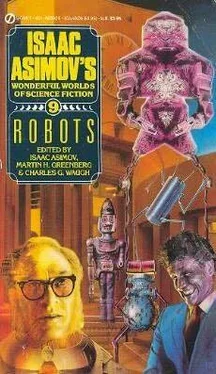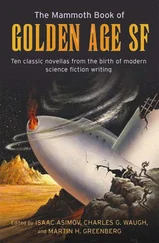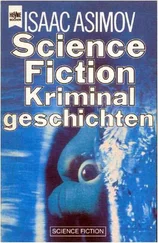Frederik Pohl - Isaac Asimov's Worlds of Science Fiction. Book 9 - Robots
Здесь есть возможность читать онлайн «Frederik Pohl - Isaac Asimov's Worlds of Science Fiction. Book 9 - Robots» весь текст электронной книги совершенно бесплатно (целиком полную версию без сокращений). В некоторых случаях можно слушать аудио, скачать через торрент в формате fb2 и присутствует краткое содержание. Год выпуска: 1989, ISBN: 1989, Издательство: Robinson Publishing, Жанр: Фантастика и фэнтези, на английском языке. Описание произведения, (предисловие) а так же отзывы посетителей доступны на портале библиотеки ЛибКат.
- Название:Isaac Asimov's Worlds of Science Fiction. Book 9: Robots
- Автор:
- Издательство:Robinson Publishing
- Жанр:
- Год:1989
- ISBN:ISBN: 1-85487-041-6
- Рейтинг книги:4 / 5. Голосов: 1
-
Избранное:Добавить в избранное
- Отзывы:
-
Ваша оценка:
- 80
- 1
- 2
- 3
- 4
- 5
Isaac Asimov's Worlds of Science Fiction. Book 9: Robots: краткое содержание, описание и аннотация
Предлагаем к чтению аннотацию, описание, краткое содержание или предисловие (зависит от того, что написал сам автор книги «Isaac Asimov's Worlds of Science Fiction. Book 9: Robots»). Если вы не нашли необходимую информацию о книге — напишите в комментариях, мы постараемся отыскать её.
Isaac Asimov's Worlds of Science Fiction. Book 9: Robots — читать онлайн бесплатно полную книгу (весь текст) целиком
Ниже представлен текст книги, разбитый по страницам. Система сохранения места последней прочитанной страницы, позволяет с удобством читать онлайн бесплатно книгу «Isaac Asimov's Worlds of Science Fiction. Book 9: Robots», без необходимости каждый раз заново искать на чём Вы остановились. Поставьте закладку, и сможете в любой момент перейти на страницу, на которой закончили чтение.
Интервал:
Закладка:
"The brain, master," Five suggested softly. "Dr. Craig's last message!"
"You operate it, Five." It was a small model, a limited fact analyzer such as most technicians used or had used to help them in their work, voice-operated, its small, basic vocabulary adjusted for the work to be done. He was unfamiliar with the semantics of that vocabulary, but Five had undoubtedly worked with Craig long enough to know it.
He watched without interest as the robot pressed down the activating key and spoke carefully chosen words into it. "Sub-total say-out! Number n say-in!"
The brain responded instantly, selecting the final recording impressed upon it by Craig, and repeating in the man's own voice, a voice shrill with age and weariness, hoarse and trembling with the death that was reaching for him as he spoke. "My last notes-inadequate! Dreams can go on. Thoradson's first analys-" For a second, there was only a slithering sound, such as a body might have made; then the brain articulated flatly: "Subtotal number n say-in, did say-out!"
It was meaningless babble to Jorgen, and he shook his head at Five. "Probably his mind was wandering. Do you know what Thoradson's first analysis was?"
"It dealt with our creation. He was, of course, necessarily trained in semantics-that was required for the operation of the complex brains used on the problem of robots. His first rough analysis was that the crux of the problem rested on the accurate definition of the word I. That can be properly defined only in terms of itself, such as the Latin cognate ego, since it does not necessarily refer to any physical or specifically definable part or operation of the individual. Roughly, it conveys a sense of individuality, and Thoradson felt that the success or failure of robots rested upon the ability to analyze and synthesize that."
For long minutes, he turned it over, but it was of no help in clarifying the dying man's words; rather, it added to the confusion. But he had felt no hope and could now feel no disappointment. When a problem has no solution, it makes little difference whether the final words of a man are coldly logical or wildly raving. The result must be the same. Certainly semantics could offer no hope where all the bacteriological skill of the race had failed.
Five touched his arm again, extending two little pellets toward him. "Master, you need sleep now; these-sodium amytal-should help. Please!"
Obediently, he stuffed them into his mouth and let the robot guide him toward a room fixed for sleeping, uncaring. Nothing could possibly matter now, and drugged sleep was as good a solution as any other. He saw Five fumble with a switch, felt his weight drop to a few pounds, making the cot feel soft and yielding, and then gave himself up dully to the compulsion of the drug. Five tiptoed quietly out, and blackness crept over his mind, welcome in the relief it brought from thinking.
Breakfast lay beside him, hot in vacuum plates, when Jorgen awoke finally, and he dabbled with it out of habit more than desire. Somewhere, during the hours of sleep, his mind had recovered somewhat from the dull pall that had lain over it, but there was still a curious suspension of his emotions. It was almost as if his mind had compressed years of forgetting into a few hours, so that his attitude toward the tragedy of his race was tinged with a sense of remoteness and distance, there was neither grief nor pain, only a vague feeling that it had happened long before and was now an accustomed thing.
He sat on the edge of his bunk, pulling on his clothes slowly and watching the smoke curl up from his cigarette, not thinking. There was no longer any purpose to thought. From far back in the ship, a dull drone of sound reached him, and he recognized it as the maximum thrust of the steering tubes, momentarily in action to swing the ship in some manner. Then it was gone, leaving only the smooth, balanced, almost inaudible purr of the main drive as before.
Finished with his clothes, he pushed through the door and into the hallway, turning instinctively forward to the observation room and toward the probable location of Five. The robots were not men, but they were the only companionship left him, and he had no desire to remain alone. The presence of the robot would be welcome. He clumped into the control room, noting that the five were all there, and moved toward the quartz port.
Five turned at his steps, stepping aside to make room for him and lifting a hand outward. "We'll be landing soon, master, I was going to call you."
"Thanks." Jorgen looked outward then, realizing the distance that had been covered since his first view. Now the sun was enlarged to the size of the old familiar sun over earth, and the sphere toward which they headed was clearly visible without the aid of the 'scope. He sank down quietly into the seat Five pulled up for him, accepting the binoculars, but making no effort to use them. The view was better as a whole, and they were nearing at a speed that would bring a closer view to him soon enough without artificial aid.
Slowly it grew before the eyes of the watchers, stretching out before them and taking on a pattern as the distance shortened. Two, at the controls, was bringing the ship about in a slow turn that would let them land to the sunward side of the planet where they had selected their landing site, and the crescent opened outward, the darkened night side retreating until the whole globe lay before them in the sunlight. Stretched across the northern hemisphere was the sprawling, horizontal continent he had seen before, a rough caricature of a running greyhound, with a long, wide river twisting down its side and emerging behind an outstretched foreleg. Mountains began at the head and circled it, running around toward the tail, and then meeting a second range along the hip. Where the great river met the sea, he could make out the outlines of a huge natural harbor, protected from the ocean, yet probably deep enough for any surface vessel. There should have been a city there, but of that there was no sign, though they were low enough now for one to be visible.
"Vegetation," Five observed. "This central plain would have a long growing season-about twelve years of spring, mild summer and fall, to be followed by perhaps four years of warm winter. The seasons would be long, master, at this distance from the sun, but the tilt of the planet is so slight that many things would grow, even in winter. Those would seem to be trees, a green forest. Green, as on earth."
Below them, a cloud drifted slowly over the landscape, and they passed through it, the energy tubes setting the air about them into swirling paths that were left behind almost instantly.
Two was frantically busy now, but their swift fall slowed rapidly, until they seemed to hover half a mile over the shore by the great sea, and then slipped downward. The ship nestled slowly into the sands and was still, while Two cut off energy and artificial gravity, leaving the faintly weaker pull of the planet in its place.
Five stirred again, a sighing sound coming from him. "No intelligence here, master. Here, by this great harbor, they would surely have built a city, even if of mud and wattle. There are no signs of one. And yet it is a beautiful world, surely designed for life." He sighed again, his eyes turned outward.
Jorgen nodded silently, the same thoughts in his own mind. It was in many ways a world superior to that his race had always known, remarkably familiar, with even a rough resemblance between plant forms here and those he had known. They had come past five suns and through ninety years of travel at nearly the speed of light to a haven beyond their wildest imaginings, where all seemed to be waiting them, untenanted but prepared. Outside, the new world waited expectantly. And inside, to meet that invitation, there were only ghosts and emptied dreams, with one slowly dying man to see and to appreciate. The gods had prepared their grim jest with painful attention to every detail needed to make it complete.
Читать дальшеИнтервал:
Закладка:
Похожие книги на «Isaac Asimov's Worlds of Science Fiction. Book 9: Robots»
Представляем Вашему вниманию похожие книги на «Isaac Asimov's Worlds of Science Fiction. Book 9: Robots» списком для выбора. Мы отобрали схожую по названию и смыслу литературу в надежде предоставить читателям больше вариантов отыскать новые, интересные, ещё непрочитанные произведения.
Обсуждение, отзывы о книге «Isaac Asimov's Worlds of Science Fiction. Book 9: Robots» и просто собственные мнения читателей. Оставьте ваши комментарии, напишите, что Вы думаете о произведении, его смысле или главных героях. Укажите что конкретно понравилось, а что нет, и почему Вы так считаете.









